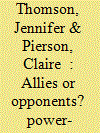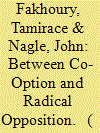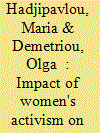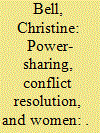|
|
|
Sort Order |
|
|
|
Items / Page
|
|
|
|
|
|
|
| Srl | Item |
| 1 |
ID:
158291


|
|
|
|
|
| Summary/Abstract |
Feminist critics of power-sharing argue that power-sharing structures privilege ethnic/ethnonational identity and impede women's descriptive and substantive political representation. This paper extends these arguments to consider the extent to which consociational theory addresses the role of civil society and women's political voice in postconflict societies. We argue that power-sharing is overly concerned with formal representation to the detriment of understanding the role civil society can play in peace building. Whilst we acknowledge the importance of civil society retaining a critical distance from political institutions, we suggest several mechanisms for incorporating civil society into power-sharing arrangements. We argue that a consideration of civil society can highlight the gendered issues that are ignored in power-sharing settings, and we conclude that a broader understanding of both “politics” and “conflict” is required for power-sharing to be more equitable to women's descriptive and substantive representation.
|
|
|
|
|
|
|
|
|
|
|
|
|
|
|
|
| 2 |
ID:
158290


|
|
|
|
|
| Summary/Abstract |
This article provides a comparative analysis of two types of power-sharing: Lebanon's corporate version and Northern Ireland's relatively liberal arrangements. Our aim is to explore whether these power-sharing institutions augment or stymie gender and LGBTQ equality, while also illuminating the complex ways in which LGBTQ movements conceptualize power-sharing. We argue that while Northern Ireland's liberal arrangements, predicated on a minority rights regime, theoretically offer opportunities for gender and LGBTQ mobilization and equality, these rights claims are frustrated as they become embroiled in the wider ethnonational conflict for group rights. In Lebanon's corporate system, alternatively, where gender and LGBTQ rights are absent, feminist and LGBTQ movements identify power-sharing as institutionalizing patriarchy and homophobia and thus engage in a radical campaign of opposition to consociationalism.
|
|
|
|
|
|
|
|
|
|
|
|
|
|
|
|
| 3 |
ID:
158289


|
|
|
|
|
| Summary/Abstract |
Power-sharing hinges on cooperation between communal parties who are expected to mobilize citizens in support of the new political system. Women are often ill-served, however, and their political differences exacerbated by such arrangements. Mindful of this finding and using data from the 2015 Northern Ireland Election Survey, we examine differences in party attachment between Catholic and Protestant women. The results suggest that Catholic women are more likely to claim a party attachment than Protestant women. The key factors accounting for this phenomenon are the differences in their levels of endorsement and the perceived effectiveness of the two main political parties.
|
|
|
|
|
|
|
|
|
|
|
|
|
|
|
|
| 4 |
ID:
158292


|
|
|
|
|
| Summary/Abstract |
This article applies key insights from feminist institutionalist analysis to power-sharing and political settlement in postconflict societies. Drawing on the concept of “gender orders,” allied with considerations of the informal and highly masculine rituals and rules that pervade institutional political life, the article demonstrates how apparent gendered gains in power-sharing are limited in their transformative effect. Despite a greater emphasis on female inclusion, as mandated by United Nations Security Council Resolution 1325, women's capacity to shape postconflict politics in power-sharing is limited. These limitations are shaped not only by the complexity of postconflict political landscapes but by women's restricted access to closed informal spaces pivotal to the masculine functioning of power-sharing. The tendency to view women's contributions in highly essentialized and feminized ways undercuts and devalorizes women's political work in power-sharing institutions. Urging greater attention to the informal life of political institutions, the article exposes the multiple layers of exclusion for women in postconflict political engagement.
|
|
|
|
|
|
|
|
|
|
|
|
|
|
|
|
| 5 |
ID:
158288


|
|
|
|
|
| Summary/Abstract |
This article focuses on Cypriot women's activism and the work of the Gender Advisory Team (GAT). Referencing United Nations Security Council Resolution 1325, GAT produced specific recommendations to the negotiators and third parties to the Cyprus peace process. In this article, we discuss GAT's recommendations regarding governance and power-sharing from a feminist perspective and the application of a gender-ethnicity nexus in the context of citizenship and belonging. Comparing the parameters used to discuss citizenship in the ongoing Cyprus peace negotiations with those of the 1960 Constitution, in this article we also examine shifts in governmentality through the conflict and postconflict periods, concentrating at each point on presumptions about gender. We argue that current discussions about citizenship are partly the result of unacknowledged considerations of gender, which have been placed on the table by gender activists. This situation poses a question about how we are to interpret the paradoxical incorporation of activist women's voices in peace processes.
|
|
|
|
|
|
|
|
|
|
|
|
|
|
|
|
| 6 |
ID:
158285


|
|
|
|
|
| Summary/Abstract |
Is ethnic power-sharing gender-blind? If so, what are the consequences? And, what, if anything, can be done about it? This line of inquiry informed a 2-day workshop at Queen's University Belfast (QUB) in November 2015, which explored the intersections of ethnonationalism and gender in comprehensive peace processes, with a specific focus on the extent to which power-sharing theory and practice can address new challenges emanating from the Women, Peace and Security (WPS) agenda, as embodied in United Nations Security Council Resolution 1325 (UNSCR 1325) and other subsequent resolutions.
|
|
|
|
|
|
|
|
|
|
|
|
|
|
|
|
| 7 |
ID:
158287


|
|
|
|
|
| Summary/Abstract |
This article revisits the gendered implications of the Dayton peace settlement in Bosnia-Herzegovina and assesses possibilities for the meaningful integration of the Women, Peace and Security agenda into the consociational structures and post-conflict political agenda. This article outlines how the reification and legitimization of ethno-nationalist power over two decades of Dayton has restricted the terrain for gender activism. A critical assessment of post-Dayton governance reveals an unanticipated stratification of the agreement. International pressure for the stability of the peace settlement further constrains the complex task of addressing the gendered legacies of conflict and conflict transformation. In this context, local and international efforts to navigate Dayton's afterlives through gender activism act as a powerful reminder that Bosnia-Herzegovina's unfulfilled peace must remain a priority in research, activist and policymaking agendas.
|
|
|
|
|
|
|
|
|
|
|
|
|
|
|
|
| 8 |
ID:
158286


|
|
|
|
|
| Summary/Abstract |
Peace processes in intrastate conflict have, since 1990, overwhelmingly institutionalized compromises between contenders for power in the form of power-sharing arrangements. This article focuses on political power-sharing, drawing qualitatively on a global data-set of peace agreements (PA-X, Peace Agreement Database). It argues that peace agreements indicate three main functions for political power-sharing: permanent group accommodation, equitable representation of minorities in autonomy regimes, and transition management. Each of these power-sharing types raises different opportunities and challenges for women's inclusion and equality. The analysis aims to inform women's engagement with power-sharing design and implementation in fragile and conflict-affected states. It also introduces the importance of function into the power-sharing literature, which is mostly concerned with form, while illustrating the value of global data on peace agreements to “midlevel analysis” capable of bridging between broad quantitative generalizations and detailed case study analysis.
|
|
|
|
|
|
|
|
|
|
|
|
|
|
|
|
|
|
|
|
|